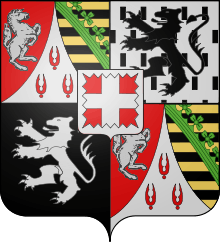Jacques, Duke of Nemours
| Jacques | |
|---|---|
| Duke of Nemours | |
 Portrait of Jacques of Savoie by an anonymous artist | |
| Spouse(s) |
Anna d'Este (m. 1566–85; his death) |
|
Issue | |
| Noble family | House of Savoy |
| Father | Philippe, Duke of Nemours |
| Mother | Charlotte van Longueville |
| Born |
12 October 1531 Vauluisant |
| Died |
18 June 1585 (aged 53) Annecy |
Jacques of Savoy, 2nd Duke of Nemours (12 October 1531 – 18 June 1585) was the son of Philippe, Duke of Nemours, and became Duke of Nemours on his father's death in 1533.
He distinguished himself at the sieges of Lens and Metz (1552–1553), at the Battle of Renty (1554) and in the campaign of Piedmont (1555).[1]
He was a supporter of the house of Guise, and had to retire for some time into Savoy in consequence of a plot. On his return to France he fought the Huguenots, and signalized himself by his successes in Dauphiné and Lyonnais. In 1567 he induced the court to return from Meaux to Paris, took part in the battle of Saint Denis, protested against the peace of Longjumeau, and repulsed the invasion of Wolfgang, Count Palatine of Zweibrücken. He devoted his last years to letters and art, and died at Annecy.[1]
He married, on 29 April 1566, Anna d'Este, daughter of Duke Ercole II of Ferrara and Renée of France, and widow of Francis, Duke of Guise. He was succeeded as Duke of Nemours by his sons, Charles Emmanuel de Savoie, 3rd Duc de Nemours and Henri I, Duke of Nemours.
A fictionalized version of the second Duke of Nemours serves as the love interest in the early novel La Princesse de Clèves, which takes place at the court of Henry II of France.
References
- 1 2
 One or more of the preceding sentences incorporates text from a publication now in the public domain: Chisholm, Hugh, ed. (1911). "Nemours, Lords and Dukes of, s.v. James". Encyclopædia Britannica. 19 (11th ed.). Cambridge University Press. p. 370.
One or more of the preceding sentences incorporates text from a publication now in the public domain: Chisholm, Hugh, ed. (1911). "Nemours, Lords and Dukes of, s.v. James". Encyclopædia Britannica. 19 (11th ed.). Cambridge University Press. p. 370.
| Preceded by Philippe de Savoie |
Duke of Nemours 1533–1585  |
Succeeded by Charles Emmanuel de Savoie |